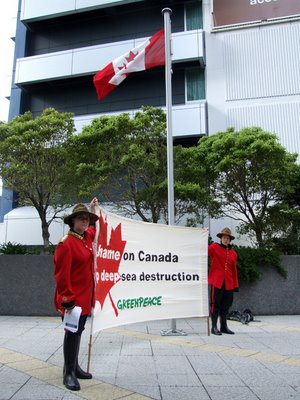Monday, October 30, 2006
Seamounties say "Canada protect sea mounts!"

Wellington, Today the Canadian High Commission got a timely reminder of Canada's necessity to learn lessons from the past and stop undermining a global moratorium on bottom trawling in international waters at the UN.
Two protesters dressed as Canadian Mounties – in this case, Sea Mounties – were joined by other Greenpeace activists handing out leaflets to Canadian High Commission staff this morning alongside a banner reading "Shame on Canada - Stop deep-sea destruction".
Greenpeace NZ delivered a letter from Greenpeace New Zealand and Environment and Conservation Organisations of New Zealand (ECO) to Canada's High Commissioner addressed to Canadian Prime Minister, Stephen Harper, which urged him to reconsider his country's opposition to a moratorium on bottom trawling in international waters.
Canada's once-abundant cod and New Zealand's orange roughy have been all but wiped out in the world's biggest fisheries disasters of modern times.
"In both cases, these fish populations have been decimated by bottom trawlers that also bulldoze their ancient habitats. Bottom trawling is like destroying paddocks in order to harvest sheep – no farmer would be that crazy," says Greenpeace political advisor Geoff Keey.
"We all need to learn from these disasters and act quickly to protect the incredible life in the deep sea. That's why it is particularly upsetting to see the Canadian Government – that should know better - undermining progress on a UN moratorium on bottom trawling in international waters".
"The science is clear, the first hand accounts and photos all back up the nasty impacts of bottom trawling. It's time for Canada to show the kind of leadership our oceans need," said Keey.
The UN meets next month to negotiate over ways to stop the destruction of deep-sea life in international waters caused by bottom trawlers – including moratorium on the practice.
Industrial bottom trawling, or 'dragging' as the Canadians call it, had become the dominant fishing practice after WWII in the centuries-old cod fishery off eastern Canada. By 1992, the cod stocks were devastated, the fishery collapsed and more than forty thousand people were thrown out of work.
"We need to see leadership from Canada, not blind repetition of past mistakes ," concluded Keey.



